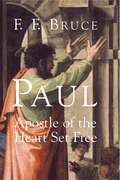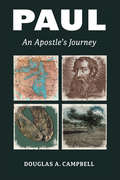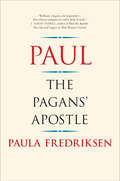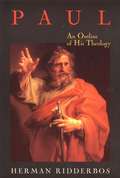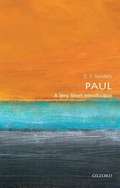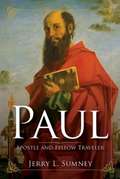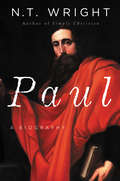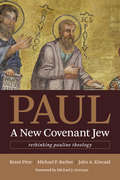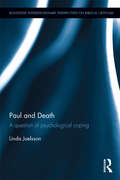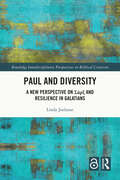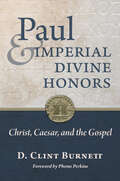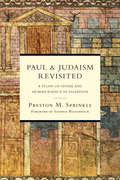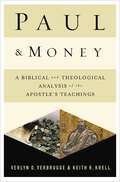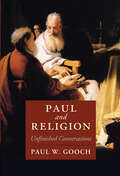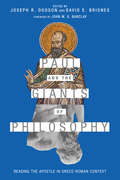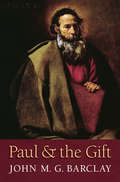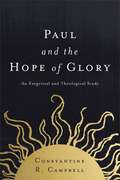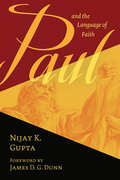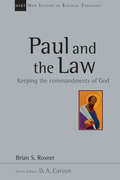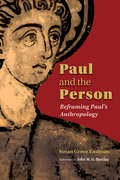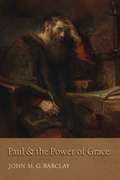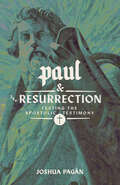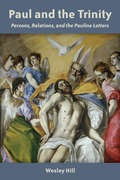- Table View
- List View
Paul: Apostle of the Heart Set Free
by F. F. BruceWritten by one of the best known and most respected biblical scholars of all time, this illustrated volume explores all of the primary themes in Paul's thought as they developed in the historical context of his life and travels. While Bruce's primary concern is to portray the life of the apostle Paul, he also examines the main themes of Paul's thought, set in their historical background and illustrated from his letters. Originally published in 1977, this new paperback edition of Paul will be used with profit by all who have an interest in the primitive church--from general readers to the most advanced biblical scholar.
Paul: An Apostle's Journey
by Douglas A. CampbellDouglas Campbell has made a name for himself as one of Paul’s most insightful and provocative interpreters. In this short and spirited book Campbell introduces readers to the apostle he has studied in depth over his scholarly career.Enter with Campbell into Paul’s world, relive the story of Paul’s action-packed ministry, and follow the development of Paul’s thought throughout both his physical and his spiritual travels.Ideal for students, individual readers, and study groups, Paul: An Apostle’s Journey dramatically recounts the life of one of early Christianity’s most fascinating figures—and offers powerful insight into his mind and his influential message.
Paul: The Pagan's Apostle
by Paula FredriksenA groundbreaking new portrait of the apostle Paul, from one of today’s leading historians of antiquity Often seen as the author of timeless Christian theology, Paul himself heatedly maintained that he lived and worked in history’s closing hours. His letters propel his readers into two ancient worlds, one Jewish, one pagan. The first was incandescent with apocalyptic hopes, expecting God through his messiah to fulfill his ancient promises of redemption to Israel. The second teemed with ancient actors, not only human but also divine: angry superhuman forces, jealous demons, and hostile cosmic gods. Both worlds are Paul’s, and his convictions about the first shaped his actions in the second. Only by situating Paul within this charged social context of gods and humans, pagans and Jews, cities, synagogues, and competing Christ-following assemblies can we begin to understand his mission and message. This original and provocative book offers a dramatically new perspective on one of history’s seminal figures.
Paul: An Outline of His Theology
by Herman RidderbosNow back in print in a beautiful new paperback edition, this study by one of Europe's foremost New Testament scholars provides a comprehensive exposition of the teaching of the apostle Paul. Firmly grounded in a careful exegesis of the biblical text and crafted with constant reference to the wealth of scholarly study of Paul's writings, this volume is a standard for interpreters of Paul's thought and all students of the New Testament.
Paul: A Very Short Introduction
by E. P. SandersMissionary, theologian, and religious genius, Paul is one of the most powerful human personalities in the history of the Church. E.P. Sanders, an influential Pauline scholar, analyzes the fundamental beliefs and vigorous contradictions in Paul's thought, discovering a philosophy that is less of a monolithic system than the apostle's convictions would seem to suggest. This volume offers an incisive summation of Paul's career, as well as his role in the development of early Christianity. Both lucid and judicious, it is the most compelling short introduction to Paul now available.
Paul: Apostle and Fellow Traveler (Symposium Ser. #Vol. 16)
by Jerry L. SumneyCovering the entire Pauline corpus the reader finds a man who was adept at persuasive arguments and providing theological answers to real and, often, thorny congregational issues. Readers have a keen understanding of Paul's place in the early church, the relationship between church and synagogue, and the relationship between the teaching of Paul and that of Jesus. These discussions set Paul firmly within the church that existed before he joined, finding that he became an adherent to much that preceded him. paying particular attention to Paul's Christology and eschatology. In this study of Paul, the reader sees a man who was adept at marshaling persuasive arguments and providing a practical theology meant to address real and often thorny congregational issues. Students will have a keen understanding of Paul's place in the early church, the relationship between church and synagogue, and the relationship between the teaching of Paul and that of Jesus. These discussions will set Paul firmly within the church that existed before he joined, finding that he became an adherent to much that preceded him. Sumney also locates Paul as an observant Jew who became convinced that God had acted to include Gentiles among the people of God. Included is an outline of each letter, study questions, and a bibliography for further study.
Paul: A Biography (The\new Testament For Everyone Ser.)
by N. T. WrightIn this definitive biography, renowned Bible scholar, Anglican bishop, and bestselling author N. T. Wright offers a radical look at the apostle Paul, illuminating the humanity and remarkable achievements of this intellectual who invented Christian theology—transforming a faith and changing the world.For centuries, Paul, the apostle who "saw the light on the Road to Damascus" and made a miraculous conversion from zealous Pharisee persecutor to devoted follower of Christ, has been one of the church’s most widely cited saints. While his influence on Christianity has been profound, N. T. Wright argues that Bible scholars and pastors have focused so much attention on Paul’s letters and theology that they have too often overlooked the essence of the man’s life and the extreme unlikelihood of what he achieved.To Wright, "The problem is that Paul is central to any understanding of earliest Christianity, yet Paul was a Jew; for many generations Christians of all kinds have struggled to put this together." Wright contends that our knowledge of Paul and appreciation for his legacy cannot be complete without an understanding of his Jewish heritage. Giving us a thoughtful, in-depth exploration of the human and intellectual drama that shaped Paul, Wright provides greater clarity of the apostle’s writings, thoughts, and ideas and helps us see them in a fresh, innovative way.Paul is a compelling modern biography that reveals the apostle’s greater role in Christian history—as an inventor of new paradigms for how we understand Jesus and what he accomplished—and celebrates his stature as one of the most effective and influential intellectuals in human history.
Paul, a New Covenant Jew: Rethinking Pauline Theology
by Brant Pitre Michael P. Barber John A. KincaidAfter the landmark work of E. P. Sanders, the task of rightly accounting for Paul's relationship to Judaism has dominated the last forty years of Pauline scholarship. Pitre, Barber, and Kincaid argue that Paul is best viewed as a new covenant Jew, a designation that allows the apostle to be fully Jewish, yet in a manner centered on the person and work of Jesus the Messiah. This new covenant Judaism provides the key that unlocks the door to many of the difficult aspects of Pauline theology.Paul, a New Covenant Jew is a rigorous, yet accessible overview of Pauline theology intended for ecumenical audiences. In particular, it aims to be the most useful and up to date text on Paul for Catholic Seminarians. The book engages the best recent scholarship on Paul from both Protestant and Catholic interpreters and serves as a launching point for ongoing Protestant-Catholic dialogue.
Paul, a New Covenant Jew: Rethinking Pauline Theology
by Brant Pitre Michael P. Barber John A. KincaidAfter the landmark work of E. P. Sanders, the task of rightly accounting for Paul's relationship to Judaism has dominated the last forty years of Pauline scholarship. Pitre, Barber, and Kincaid argue that Paul is best viewed as a new covenant Jew, a designation that allows the apostle to be fully Jewish, yet in a manner centered on the person and work of Jesus the Messiah. This new covenant Judaism provides the key that unlocks the door to many of the difficult aspects of Pauline theology.Paul, a New Covenant Jew is a rigorous, yet accessible overview of Pauline theology intended for ecumenical audiences. In particular, it aims to be the most useful and up to date text on Paul for Catholic Seminarians. The book engages the best recent scholarship on Paul from both Protestant and Catholic interpreters and serves as a launching point for ongoing Protestant-Catholic dialogue.
Paul and Death: A Question of Psychological Coping (Routledge Interdisciplinary Perspectives on Biblical Criticism)
by Linda JoelssonThe concept of death, particularly violent death, is prevalent throughout the writings of Paul the Apostle. His letters in the New Testament address this topic from a variety of perspectives, some of which can appear to be almost contradictory. However, this need not be problematic. Paul and Death uses the method of psychological exegesis to show that the different attitudes toward death in Paul’s letters make for a much more coherent discourse if they are seen as an aid to individual and collective psychological coping. Taking the differences between each of Paul’s letters as its starting point, this study suggests that a variety of coping strategies in relation to death may be beneficial depending on the situation, the person, and the stage of the coping process. Drawing on psychologically-oriented hermeneutic theory, and theories about psychological coping in particular, the author argues that each case of psychological coping must be understood in its historical situation, and as strategies emanating from a specific person’s subjective appraisal. Combining theology and biblical studies with modern psychology, this book will be of particular interest to academics and students that are studying the relationship between Religion and notions of Death.
Paul and Diversity: A New Perspective on Σάρξ and Resilience in Galatians (Routledge Interdisciplinary Perspectives on Biblical Criticism)
by Linda JoelssonThis book investigates attitudes toward diversity as expressed in Paul’s letter to the Galatians and proposes a renewed understanding of the term σάρξ as used in this letter. Σάρξ (sarx) is usually translated as "flesh" and has often been perceived in theological studies as a complicated and highly polysemous term. It is also a word whose interpretations have had far-reaching social, political, and religious consequences throughout history. The author argues in this volume that for Paul the term σάρξ is commonly adopted with reference to the collective group, and in light of a sense of collective identity in particular. A key assertion is that Paul was and remained a Jew and also continued to be deeply concerned with the prospects for the peaceful co-existence of Jews and Gentiles in the assemblies of God. The chapters draw on perspectives from classical rhetoric, modern linguistics, and social systems theory in order to describe the communicative structure of the letter, the construct of collective identity as described within this setting, and the potential for resilience in this construct. Offering a more coherent reading of Galatians, the book contributes positively to current discussions in Pauline studies and will be of interest to scholars of biblical studies and theology.
Paul and Imperial Divine Honors: Christ, Caesar, and the Gospel
by D. Clint BurnettHow did the imperial cult affect Christians in the Roman Empire? &“Jesus is lord, not Caesar.&” Many scholars and preachers attribute mistreatment of early Christians by Roman authorities to this fundamental confessional conflict. But this mantra relies on a reductive understanding of the imperial cult. D. Clint Burnett examines copious evidence—literary, epigraphic, numismatic, and archaeological—to more accurately reconstruct Christian engagement with imperial divine honors. Outdated narratives often treat imperial divine honors as uniform and centralized, focusing on the city of Rome. Instead, Burnett examines divine honors in Philippi, Thessalonica, and Corinth. While all three cities incorporated imperial cultic activity in their social, religious, economic, and political life, the purposes and contours of the practice varied based on the city&’s unique history. For instance, Thessalonica paid divine honors to living Julio-Claudians as tribute for their status as a free city in the empire—and Christian resistance to the practice was seen as a threat to that independence. Ultimately, Burnett argues that early Christianity was not specifically antigovernment but more broadly countercultural, and that responses to this stance ranged from conflict to apathy. Burnett&’s compelling argument challenges common assumptions about the first Christians&’ place in the Roman Empire. This fresh account will benefit Christians seeking to understand their faith&’s place in public life today.
Paul and Judaism Revisited: A Study of Divine and Human Agency in Salvation
by Preston M. SprinklePreaching's Preacher's Guide to the Best Bible Reference for 2014 (Pauline Studies) Ever since E. P. Sanders published Paul and Palestinian Judaism in 1977, students of Paul have been probing, weighing and debating the similarities and dissimilarities between the understandings of salvation in Judaism and in Paul. Do they really share a common notion of divine and human agency? Or do they differ at a deep level? And if so, how? Broadly speaking, the answers have lined up on either side of the old perspective and new perspective divide. But can we move beyond this impasse? Preston Sprinkle reviews the state of the question and then tackles the problem. Buried in the Old Testament's Deuteronomic and prophetic perspectives on divine and human agency, he finds a key that starts to turn the rusted lock on Paul's critique of Judaism. Here is a proposal that offers a new line of investigation and thinking about a crucial issue in Pauline theology.
Paul and Money: A Biblical and Theological Analysis of the Apostle’s Teachings and Practices
by Verlyn Verbrugge Keith R. KrellThe apostle Paul, one of the most prominent figures in the early Jesus movement, had a lot to say about money. His letters deal with real people as they lived their Christian lives in the Greco-Roman world. He finds it necessary to address “those who are rich in this present world” (1 Tim 6:17). But he also has to address those do not want to work, for whatever reason, and are “idle and disruptive” (2 Thess 3:6). Moreover, whereas most churches today have a certain socio-economic homogeneity, some of Paul’s churches had a combination of upper class wealthy people and lower class slaves worshiping side-by-side, and it inevitably created friction (esp. 1 Cor 11:17–34). During the past twenty years a significant amount of research has been done on class-consciousness in the Greco-Roman world and on the significance of Paul’s fund-raising venture “for the poor among the Lord’s people in Jerusalem”—“the collection”—for his ministry. Relying on the surprising results of current Pauline scholarship and a careful exegesis of a variety of New Testament texts, this book offers a thorough investigation of the apostle Paul’s sayings and dealings with money.
Paul and Religion: Unfinished Conversations (Cambridge Studies in Religion, Philosophy, and Society)
by Paul W. GoochPaul and Religion demonstrates the continuing and contemporary relevance of the most important, and most controversial, figure of early Christianity. Paul Gooch interrogates the Pauline writings for their meaning as well as implications for religion as an entire form of life, a stance on the world expressed in distinctive practices. Bringing a philosophical approach to this topic, he connects Paul's ideas to lived experience. In a conversational style, Gooch explores Paul's experience of grace and his dismissal of distinctive markers of religious identity in favour of love as binding together a community. Contrary to common expectations, he finds within Paul's letters material for conversations about issues in our day, such as gender and sexuality. From his close reading of the Letters, Gooch argues that the Pauline religious form of life is not identical with institutional Christianity. Indeed, his conclusions may be welcome to those who belong to other faiths.
Paul and the Giants of Philosophy: Reading the Apostle in Greco-Roman Context
by Joseph R. DodsonWhat forces shaped the intellectual world of the apostle Paul? How familiar was he with the great philosophers of his age, and to what extent was he influenced by them? When he quoted Greco-Roman sources, what was his aim? Pauline scholars wrestle with such questions in journal articles and technical monographs, but now Paul and the Giants of Philosophy brings the conversation into the college classroom and the church. Each essay addresses Paul's interaction with Greco-Roman philosophical thinking on a particular topic, such as faith, slavery, gift-giving, and the afterlife. And each chapter includes discussion questions and reading lists to help readers engage the material further. Dodson and Briones have gathered contributors with diverse views from various traditions who are united in the desire to make Paul's engagement with ancient philosophy accessible to many readers.
Paul and the Gift
by John M. BarclayA fresh scholarly reading of grace in Paul's theology In this book esteemed Pauline scholar John Barclay presents a strikingly fresh reading of grace in Paul's theology, studying it in view of ancient notions of "gift" and shining new light on Paul's relationship to Second Temple Judaism.Paul and the Gift centers on divine gift-giving, which for Paul, Barclay says, is focused and fulfilled in the gift of Christ. He offers a new appraisal of Paul's theology of the Christ-event as gift as it comes to expression in Galatians and Romans, and he presents a nuanced and detailed discussion of the history of reception of Paul. This exegetically responsible, theologically informed, hermeneutically useful book shows that a respectful, though not uncritical, reading of Paul contains resources that remain important for Christians today.
Paul and the Hope of Glory: An Exegetical and Theological Study
by Constantine R. CampbellA Unique Study of Pauline Eschatology that Is Both Exegetical and TheologicalOne of the trajectories coming out of Constantine Campbell's award-winning book Paul and Union with Christ is the significance of eschatology for the apostle. Along with union with Christ, eschatology is a feature of Paul&’s thinking that affects virtually everything else.While union with Christ is the "webbing" that joins Paul's thought together, eschatology provides the "shape" of his thought, and thus gives shape to his teaching about justification, resurrection, the cross, ethics, and so forth. There is considerable debate, however, about Paul's eschatology, asking whether he is a "covenant" or an "apocalyptic" theologian.In Paul and the Hope of Glory Campbell conducts a thorough exegetical study of the relevant elements of Paul's eschatological language, metaphors, and images including "parousia," "the last day," "inheritance," "hope," and others. He examines each passage in context, aiming to build inductively an overall sense of Paul's thinking. The results of this exegetical study then feed into a theological study that demonstrates the integration of Paul's eschatological thought into his overall theological framework.The study is comprised of three parts:The first part introduces the key issues--both exegetical and theological--and sets the parameters and methodology of the book. It also offers an historical survey of the scholarly work produced on Paul's eschatology through the twentieth century to the present day.The second part contains the detailed exegetical analysis, with chapters on each important Pauline phrase, metaphor, and image related to eschatology.The third part turns its attention to theological synthesis. It recapitulates relevant conclusions from the evidence adduced in part two and launches into theological discussion engaging current issues and debates.This volume combines high-level scholarship and a concern for practical application of a topic currently debated in the academy and the church. More than a monograph, this book is a helpful reference tool for students, scholars, and pastors to consult its treatment of any particular instance of any phrase or metaphor that relates to eschatology in Paul's thinking.
Paul and the Language of Faith
by Nijay K. GuptaA dynamic reading of Paul&’s faith language, outlining its subtle nuances as belief, trust, and faithfulness.Faith language permeates the letters of Paul. Yet, its exact meaning is not always clear. Many today, reflecting centuries of interpretation, consider belief in Jesus to be a passive act. In this important book, Nijay Gupta challenges common assumptions in the interpretation of Paul and calls for a reexamination of Paul&’s faith language. Gupta argues that Paul&’s faith language resonates with a Jewish understanding of covenant involving goodwill, trust, and expectation. Paul&’s understanding of faith involves the transformation of one&’s perception of God and the world through Christ, relational dependence on Christ, as well as active loyalty to Christ. Pastors and scholars alike will benefit from this close examination of Paul&’s understanding and use of faith language. For Gupta, Paul&’s understanding involves a divine-human relationship centered on Christ that believes, trusts, and obeys.
Paul and the Law: Keeping the Commandments of God (New Studies in Biblical Theology #Volume 31)
by Brian S. RosnerPreaching's Preacher's Guide to the Best Bible Reference for 2014 (Pauline Studies) "For neither circumcision counts for anything nor uncircumcision, but keeping the commandments of God" (1 Cor 7:19). The apostle Paul's relationship to the Law of Moses is notoriously complex and much studied. Difficulties begin with questions of definition (of the extent of Paul's corpus and the meanings of "the law") and are exacerbated by numerous problems of interpretation of the key texts. Major positions are entrenched, yet none of them seems to know what to do with all the pieces of the puzzle. Inextricably linked to Paul's view of the law is his teaching concerning salvation history, Israel, the church, anthropology, ethics and eschatology. Understanding "Paul and the law" is critical to the study of the New Testament, because it touches on the perennial question of the relationship between the grace of God in the gift of salvation and the demand of God in the call for holy living. Misunderstanding can lead to distortions of one or both. This fresh and valuable study is something of a breakthrough, bringing neglected evidence to the discussion and asking different questions of the material, while also building on the work of others. Brian Rosner argues that Paul undertakes a polemical re-evaluation of the Law of Moses, which involves not only its repudiation as law-covenant and its replacement by other things, but also its wholehearted re-appropriation as prophecy (with reference to the gospel) and as wisdom (for Christian living).
Paul and the Person: Reframing Paul's Anthropology
by Susan Grove EastmanIn this book Susan Grove Eastman presents a fresh and innovative exploration of Paul&’s participatory theology in conversation with both ancient and contemporary conceptions of the self. Juxtaposing Paul, ancient philosophers, and modern theorists of the person, Eastman opens up a conversation that illuminates Paul&’s thought in new ways and brings his voice into current debates about personhood.
Paul and the Person: Reframing Paul's Anthropology
by Susan Grove EastmanIn this book Susan Grove Eastman presents a fresh and innovative exploration of Paul&’s participatory theology in conversation with both ancient and contemporary conceptions of the self. Juxtaposing Paul, ancient philosophers, and modern theorists of the person, Eastman opens up a conversation that illuminates Paul&’s thought in new ways and brings his voice into current debates about personhood.
Paul and the Power of Grace
by John M. BarclayPaul and the Gift transformed the landscape of Pauline studies upon its publication in 2015. In it, John Barclay led readers through a recontextualized analysis of grace and interrogated Paul&’s original meaning in declaring it a &“free gift&” from God, revealing grace as a multifaceted concept that is socially radical and unconditioned—even if not unconditional. Paul and the Power of Grace offers all of the most significant contributions from Paul and the Gift in a package several hundred pages shorter and more accessible. Additionally, Barclay adds further analysis of the theme of gift and grace in Paul&’s other letters—besides just Romans and Galatians—and explores contemporary implications for this new view of grace.
Paul and the Resurrection: Testing the Apostolic Testimony
by Joshua A. PagánFor the contemporary believer, Paul's role in the historical setting of the Resurrection is far more than a matter of theological curiosity. The Christian justification for rational belief in the Resurrection is in large part anchored in Paul's justification for rational belief in the authenticity of his own experience. In Paul we find the earliest and best attested documentary evidence for a historical investigation of the miraculous event. Moreover, his epistles are an indispensable source of independent corroboration of the gospel narratives. Opponents of Christianity have formulated a variety of hypotheses to account for Paul's experience on the Damascus Road. Some propose that Paul was deceptive; others argue that he was deluded; and still others contend he came to believe a legendary development. Yet according to the Christian hypothesis, Paul's claim to have encountered the risen Jesus is dependable, and his testimony can be shown to withstand the scrutiny of critics. In this innovative, interdisciplinary study, PagÁn combines the analytic tools of history and philosophy to explore and evaluate competing explanations of Paul's belief in the Resurrection of Jesus.
Paul and the Trinity: Persons, Relations, and the Pauline Letters
by Wesley HillPaul’s ways of speaking about God, Jesus, and the Spirit are intricately intertwined: talking about any one of the three, for Paul, implies reference to all of them together. However, much current Pauline scholarship discusses Paul’s God-, Christ-, and Spirit-language without reference to trinitarian theology.In contrast to that trend, Wesley Hill argues in this book that later, post-Pauline trinitarian theologies represent a better approach, opening a fresh angle on Paul’s earlier talk about God the Father, Jesus Christ, and the Spirit. Hill looks critically at certain well-known discussions in the field of New Testament studies -- those by N. T. Wright, Richard Bauckham, Larry Hurtado, and others -- in light of patristic and contemporary trinitarian theologies, resulting in an innovative approach to an old set of questions.Adeptly integrating biblical exegesis and historical-systematic theology, Hill’s Paul and the Trinity shows how trinitarian theologies illumine interpretive difficulties in a way that more recent theological concepts have failed to do.Watch a 2015 interview with the author of this book here:
